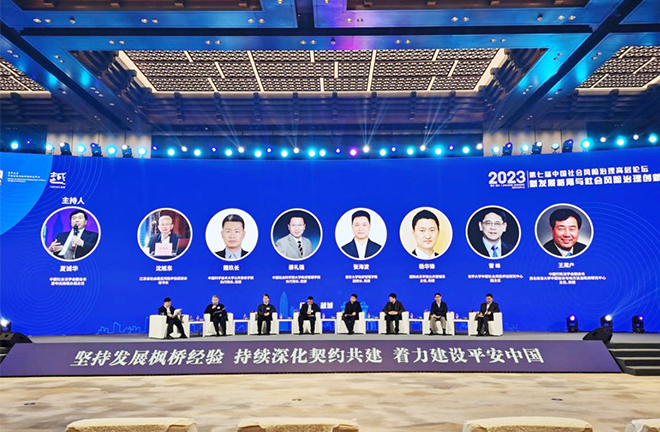‘Fengqiao experience’ empowers governance of social risk

A forum on “Fengqiao experience” and social risk governance in Shaoxing, Zhejiang Province, in mid-December, 2023 Photo: Duan Danjie/CSST
The 7th China High-Level Forum on Social Risk Governance under the theme of “New Development Pattern and Innovation in Social Risk Governance” was held in Shaoxing, Zhejiang Province, in mid-December 2023. Participating experts examined the “Fengqiao experience” [originated in Fengqiao Town, Shaoxing, in the 1960s, renowned for its efficient dispute resolution by mediation] in the new era and the key issues of social risk governance, aiming to further implement the spirit of the important speech by General Secretary of the CPC Central Committee Xi Jinping in Zhejiang.
Fengqiao experience
“The primary level represents the forefront of social governance,” said Guo Yong, deputy Party secretary of Tsinghua University. The Fengqiao experience, originally focused on addressing issues at the primary level, has evolved from a local initiative to a national model, transcending from a mere method to a guiding principle. It now serves as a paradigm for implementing the Party’s mass line in the new era and has been entrusted with a renewed and prestigious mission.
Chen Zhimin, chairman of the China Association for Friendship and deputy chairman of the Committee on Social and Legal Affairs of the 13th National Committee of the CPPCC, stated that Zhejiang has taken the Fengqiao experience as the primary focus of its public security efforts, paving a new path that balances development and stability, as well as prosperity and public security.
Shaoxing city has been striving to expand the Fengqiao experience from rural to urban communities, establishing a series of exemplary primary-level governance models. According to Xu Jun, a member of the Standing Committee of the Shaoxing Municipal Party Committee and secretary of the Yuecheng District Party Committee, Yuecheng has integrated the concept of “contract-based” co-construction into primary-level governance in an all-round way, mobilizing direct forces from the primary level, empowering governance with digital technology, and seeking on-the-spot conflict resolution. These efforts have effectively crafted a prestigious urban version of the Fengqiao experience in the new era.
Defusing risk
The new stage of development is confronted with more complicated internal and external environments, calling for research on social risks within the framework of the new development pattern and the evolving economic landscape.
The assessment of social stability risks represents a politically proactive institutional framework that encompasses policy development and risk mitigation. It also serves as a foundation for significant institutional innovation tailored to national circumstances and the demands of social practice. Zhu Zhengwei, director of the Research Center for Public Security and Emergency Management at Xi’an Jiaotong University, said that in a complex risk environment, the difficulty of major decision-making and the associated risks inherent in China’s modernization process have increased. Therefore, there is an increased imperative to optimize the social risk assessment and governance system for major decision-making, as well as improve scientific decision-making capabilities.
Generative AI is yielding both positive effects and potential risks on economic and social development. Lan Xue, a distinguished professor of arts, humanities, and social sciences at Tsinghua and director of the special committee of the Center for Social Risk Assessment in China at Tsinghua, emphasized the importance of discerning the inherent principles of AI development, promoting the extensive utilization of AI technology in social governance, and implementing a flexible governance framework to mitigate AI-related risks. Meanwhile, AI should be incorporated into the national education system to cultivate widespread competence across society.
Affect can function as both a social adhesive and a divisive agent. Affective issues warrant significant attention, as they have the potential to foster unity among people and strengthen social mobilization and social security, but may also give rise to irrational emotional catharsis and contribute to mass incidents, cautioned Shan Guangnai, a research fellow from the Institute of Sociology at the Chinese Academy of Social Sciences.
In the view of Li Xiaolin, director of the Research Center for National Risk Governance and Insurance Service Innovation at the Central University of Finance and Economics, as social risk governance enters a new phase, the factor structure of any risk can theoretically be extracted for analysis. This requires efforts to establish a risk stratification model, featuring risk factor combination management, isolation management, and alignment management.
The forum was co-hosted by the Center for Social Risk Assessment in China at Tsinghua and the CPC Shaoxing Municipal Committee.
Edited by YANG LANLAN

 PRINT
PRINT CLOSE
CLOSE